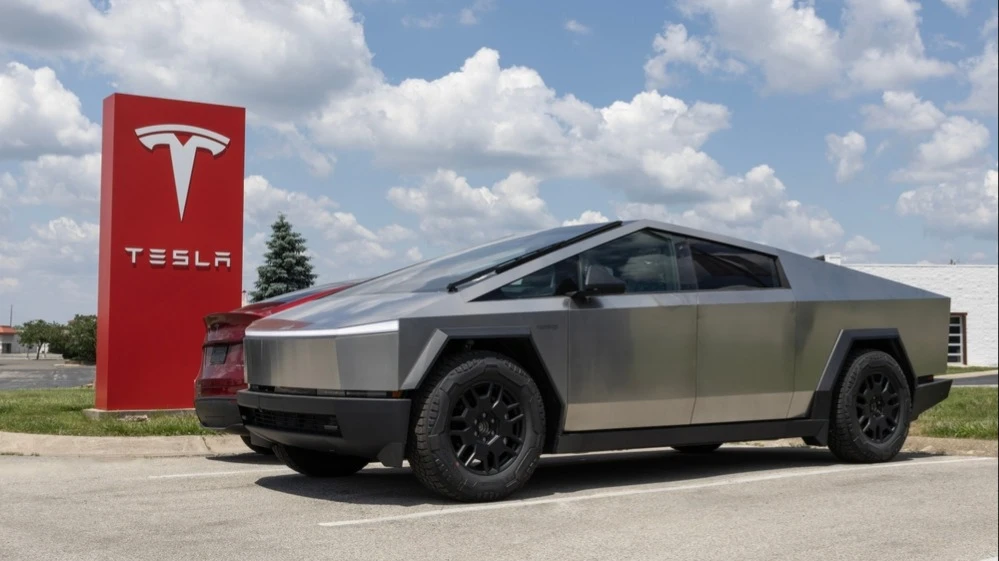Tesla sales in Europe fall for the seventh consecutive month. What risks are there for investors?
Declining demand, an outdated model lineup and competitive pressures increase risks for Tesla investors

Demand for Tesla electric cars in Europe declined for the seventh consecutive month in July. At the same time, Chinese rival BYD showed strong sales growth over the same period. Since the beginning of the year, the American manufacturer has lost about 13% of its market value. Investors are concerned about the outdated model range and reputational risks of Elon Musk, while analysts note the overvaluation of Tesla securities.
Details
Tesla shares were again under the scrutiny of investors after the publication of July data on car sales in Europe: they showed that the company continues to lose ground in one of the most competitive markets for electric cars. This is the seventh consecutive month of declining demand for Tesla products in the region. At the premarket on August 28, the electric car maker's papers show a weak growth of less than 0.1%.
Statistics published by the European Automobile Manufacturers Association (ACEA) have confirmed that Chinese rival BYD has again overtaken Tesla in EU sales, reinforcing concerns about the company's growth rate and long-term valuation.
The number of new registrations of Tesla vehicles totaled 8,837 in July, down 40% from a year earlier. By comparison, BYD registered 13,503 vehicles, a 225% year-on-year increase.
It's not just BYD that poses a threat to Tesla: Chinese state-owned SAIC Motor also surpassed the manufacturer in European sales in July.
Why it's important for investors
Tesla's net income fell by 16% in the second quarter. The company is trying to revive demand by updating its model range: Model Y, Model S, Model X have been modernized, and a more affordable version of Cybertruck has been released, notes Investing.com analyst Hasay Hashimov.
However, the overall electric car market in the EU showed a 39% increase in July, including a 58% jump in Germany. This emphasizes that Tesla's problems are competitive rather than cyclical: companies such as Volkswagen have increased sales, while Tesla's share has declined amid market growth.
For investors, this means the risk that Tesla's premium valuation, based on expectations of long-term leadership, may not be justified, Hashimov elaborates.
The decline in sales also carries currency implications. A significant portion of Tesla's revenue comes from overseas markets, and the decline in competitiveness in Europe is undermining the company's foreign earnings. That said, the euro-dollar exchange rate remains stable, and Tesla is not benefiting from currency revaluation, which could mitigate the decline in volumes.
Tesla has previously faced pressure from competitors, but the scale of BYD's growth in Europe may make the current situation special, the expert emphasizes. Investors still trust Elon Musk to fulfill plans in the U.S. and develop artificial intelligence, but European statistics are becoming more and more alarming.
If Tesla fails to stabilize EU sales and maintain margins, the stock could come under further pressure, especially amid a capital flight to sectors that directly benefit from lower rates.
What's going on with Tesla stock right now
Tesla shares rose 13.4% in August, but remain 28% below their yearly high and have lost about 13% since the beginning of the year, Investor's Business Daily writes. At the premarket on August 28, the securities were weakly up 0.07% at the time of writing, and closed down 0.6% a day earlier.
Some investors and analysts believe that Tesla shares remain overvalued and have downside potential, Benzinga notes . Thus, fund manager T. Rowe Capital's David Giroux said, "Tesla could fall 90% tomorrow and I still won't buy a single share because it's insanely overvalued."
At the same time, John Rock, head of technical strategy at 22V Research, believes that "Tesla is now in the process of forming a four-and-a-half-year large base"(quoted in Barron's). A base, the analyst explains, is a period of sideways trading when the market is "digesting" previous growth. It can serve as a platform for further upward movement.
What exactly will be the driver for the stock is an open question. RBC analyst Tom Narayan notes growing investor interest in the direction of humanoid robots. Tesla plans to start selling significant volumes of AI-trained humanoids in 2026, he adds.
According to TipRanks, Tesla stock has received 13 "buy," 15 "hold," and 8 "sell" recommendations in the past three months. The average target level is $305, suggesting a potential decline of about 12% from the current price of $347.
Context
Elon Musk's automaker is not only facing problems in Europe, but also reputational damage to the brand - due to the billionaire's harsh statements and his ties to Donald Trump's administration, CNBC writes.
Globally, the situation has also worsened, with car sales revenue declining in the second quarter and Musk himself warning that the company is in for "some tough quarters".
One of the key factors remains the lack of a major model lineup refresh. This year Tesla announced that it is working on a more affordable electric car, mass production of which is scheduled for the second half of 2025. It is with this model that investors pin their hopes for a sales recovery.
According to Thomas Besson, head of automotive at Kepler Cheuvreux, Tesla management is trying to convince investors that the company is "not really a carmaker" by shifting its focus to artificial intelligence, robotics and autonomous technology.
"They talk about almost everything except the vehicles themselves, which are now selling worse and worse. Their lineup is badly outdated compared to their competitors, and their latest products have not been as successful as expected, particularly the Cybertruck," Besson emphasized.
This article was AI-translated and verified by a human editor
